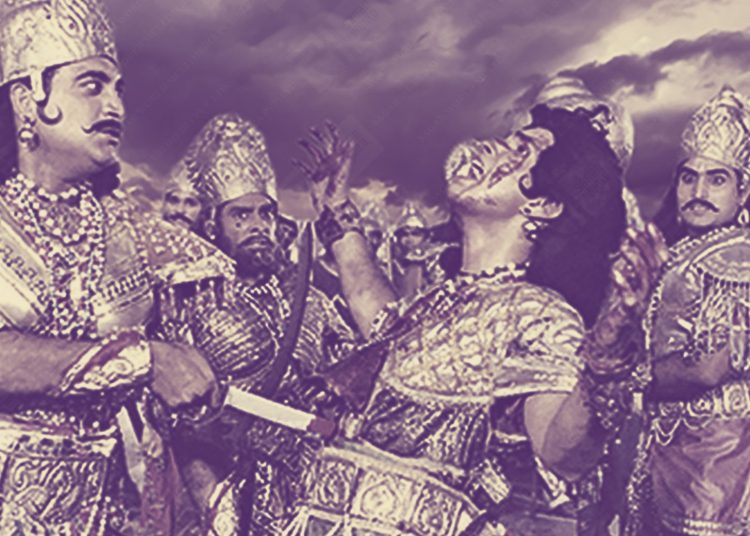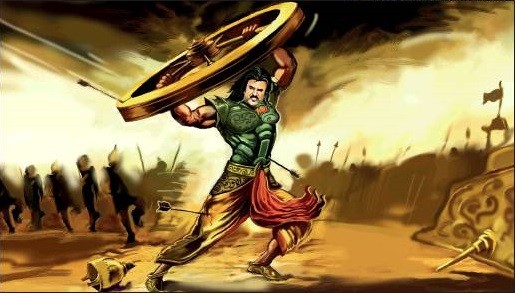Whenever we think of warriors from the Mahabharata, the first names that come to mind are often Arjuna, Bhishma, or Karna. But there’s one name that symbolizes youthful valor, sacrifice, and an undying spirit—Abhimanyu.
Born to Arjuna and Subhadra, Abhimanyu was no ordinary prince. He was the nephew of Lord Krishna, the son of the greatest archer, and the heir to the Pandava lineage. But despite his royal birth, his story is not just about privilege; it is about courage, sacrifice, and an untimely yet heroic end that became a turning point in the great war of Kurukshetra.
Abhimanyu’s life teaches us profound lessons about duty, fearlessness, and destiny. In this blog, we will explore his birth, early life, warrior skills, the legendary Chakravyuha battle, his sacrifice, and his eternal legacy.
Who was Abhimanyu?
Abhimanyu was born in Indraprastha to Arjuna and Subhadra. Being the son of the greatest archer of all time, he was destined to become a warrior. But his training started even before he was born!
One of the most fascinating stories about Abhimanyu is how he learned about warfare while still in his mother’s womb. One evening, as Lord Krishna explained the complex Chakravyuha formation to Subhadra, the unborn Abhimanyu attentively listened. He understood how to enter the formation, but before Krishna could explain the way out, Subhadra fell asleep. This incomplete knowledge would later become the defining moment of his life.
As he grew up, Abhimanyu was trained by the best warriors of his time—his father Arjuna, Krishna, Bhishma, and Guru Drona. His skills in archery, swordsmanship, and warfare made him one of the most promising young warriors of the Pandava camp.
Apart from being a warrior, Abhimanyu was a devoted husband. He married Uttara, the princess of Matsya, and their love story symbolized joy and hope amidst the looming war.
Abhimanyu – The Young Warrior
Despite his young age, Abhimanyu displayed immense bravery and leadership on the battlefield. He was fearless, skilled, and committed to upholding dharma. Even the veterans of the war acknowledged his unmatched courage.
Unlike many who fought for personal pride, Abhimanyu fought for his family, righteousness, and duty. His loyalty to the Pandavas was unshakable. He didn’t just inherit the skill of his father, but also his determination and selflessness.
In many ways, Abhimanyu represents the spirit of youth—bold, ambitious, and ready to take on challenges, even when the odds seem impossible.
The Chakravyuha Battle – Abhimanyu’s Greatest Fight
The most defining moment of Abhimanyu’s life was the 13th day of the Kurukshetra war. The Kauravas, under Dronacharya’s leadership, formed the Chakravyuha, a multi-layered military formation that was almost impossible to break. Only Arjuna and Krishna knew how to counter it, but they were lured away by the Kauravas.
With no one else capable of breaking the formation, Abhimanyu volunteered. Even though he knew only how to enter and not how to exit, he chose duty over fear.
The battle that followed was one of the most unfair and brutal moments in the Mahabharata. As Abhimanyu penetrated deep into the formation, he fought like a lion, slaying thousands of enemy soldiers. But soon, he found himself trapped, alone against the greatest Kaurava warriors.

Dronacharya, Karna, Dushasana, and Ashwatthama all attacked him together, breaking the basic rules of warfare. Despite being outnumbered, Abhimanyu fought valiantly. He picked up a chariot wheel as a weapon when his bow was broken, displaying his indomitable warrior spirit.
Ultimately, he was overpowered and killed, marking one of the darkest yet most heroic moments in the epic. But his death was not in vain; it became a turning point in the war.
The Impact of Abhimanyu’s Sacrifice
When the Pandavas learned of Abhimanyu’s unjust killing, their grief knew no bounds. Arjuna’s anguish turned into unstoppable rage, and he vowed to kill Jayadratha, the Kaurava prince who had prevented Abhimanyu’s rescue. The very next day, Arjuna fulfilled his vow, avenging his son’s death.
But the real loss was not just for the Pandavas, but for Dharma itself. Abhimanyu’s death was a reminder of how war destroys even the most innocent and noble.
His wife Uttara was pregnant with their son, Parikshit, who later became the ruler of Hastinapura. Through him, Abhimanyu’s legacy lived on, ensuring the continuation of the Pandava lineage.
Lessons from his life
Abhimanyu’s story is more than just a tale of war; it carries timeless lessons:
- Fearlessness in adversity – Even when he knew he might not come out alive, he still chose to fight for righteousness.
- The importance of knowledge – His incomplete learning about the Chakravyuha shows why knowing the full picture is crucial before taking risks.
- Sacrifice and duty – Abhimanyu’s life teaches us that sometimes, we have to fight for something bigger than ourselves.
- Relevance in modern times – In today’s world, Abhimanyu symbolizes determination, resilience, and the courage to take on challenges head-on.
Even today, Abhimanyu is remembered as a symbol of youthful strength and undying spirit. His name is synonymous with bravery, sacrifice, and selfless devotion to Dharma.
Abhimanyu’s story is one of greatness, sacrifice, and destiny. Though his time on Earth was short, his legacy remains immortal. He was not just a warrior; he was a force of inspiration.
His life teaches us that true heroes are not defined by how long they live, but by how they live. Abhimanyu may have fallen in battle, but his name continues to shine as one of the greatest warriors of the Mahabharata.
In our own lives, when we face challenges, may we all remember the spirit of Abhimanyu—to face every battle with courage, even when the odds are against us.

